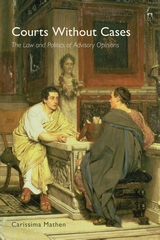Courts without cases
the law and politics of advisory opinions
- ISBN: 9781509922499
- Editorial: Hart Publishing
- Fecha de la edición: 2019
- Lugar de la edición: Oxford. Reino Unido
- Encuadernación: Cartoné
- Medidas: 24 cm
- Nº Pág.: 253
- Idiomas: Español

Since 1875, Canadian courts have been permitted to act as advisors alongside their ordinary, adjudicative role. This book offers the first detailed examination of that role from a legal perspective.
When one thinks of courts, it is most often in the context of deciding cases: live disputes involving spirited, adversarial debate between opposing parties. Sometimes, though, a court is granted the power to answer questions in the absence of such disputes through advisory opinions (also called references). These proceedings raise many questions: about the judicial role, about the relationship between courts and those who seek their 'advice', and about the nature of law.
Tracking their use in Canada since the country's Confederation and looking to the experience of other legal systems, the book considers how advisory opinions draw courts into the complex relationship between law and politics.
With attention to key themes such as the separation of powers, federalism, rights and precedent, this book provides an important and timely study of a fascinating phenomenon.
Introduction
1. Courts with Cases
What Do Courts Do?
The Power, and Limits, of Cases
The Separation of Powers
Separation of Powers in Canada
2. Apex Courts
The Judicial Committee
'A Judicial Department in Every Well-Organized Government'
A. Confederation
B. Establishment
3. Canadian References
Framing the Function
Early Quiet, Early Reform
Squaring Advisory Opinions with a General Court of Appeal
Putting the 'Advisory' in an Advisory Function
4. Separate Functions – Separate Powers
Executive Requests and Judicial Resistance
The Lonely Legislature?
5. Arbitrating Federalism
Federalism Post-Confederation
A. Treaties
B. Disallowance
C. Marriage
Apex Change – The Revamped Court
A. Natural Resources
B. Infl ation and Emergency
C. Inter-provincial Trade
Current Battles
A. Criminal Law
B. Economic Regulation
C. Environment and Development
6. Rebirth, and Rupture
Supreme at Last
Constitutional Rebirth
A. The Path to Change
B. Patriation
C. Consequences: Quebec Veto
7. Interpretation and Rights
Prologue: Process and Persons
An Age of Rights
A. Fundamental Justice and Criminal Fault (Motor Vehicle)
B. The Rule of Law (Manitoba Language)
C. Competing Constitutional Interests (Bill 30)
D. Revisiting Past Decisions (Prostitution)
E. The Intersection of Individual Rights, Federalism and Politics (Same-Sex Marriage)
8. Institutions
Rupture, for Real: Quebec Secession
Amendment, Actors and Judicial Supremacy
A. Frozen in Time: Senate Reform
B. Self-entrenchment
9. Actors, Advice and Law
The Core Tension
Why Pursue?
A. Doctrinal Guidance
B. Co-ordination
C. Strategy
D. Imprimatur
Why Not Comply?
Why Comply?
10. The Advisory Court
Process
Authority, Precedent, Stare Decisis
Providing Answers
A. Abstract Review
B. Answers, Declarations, Remedies
Conclusion






